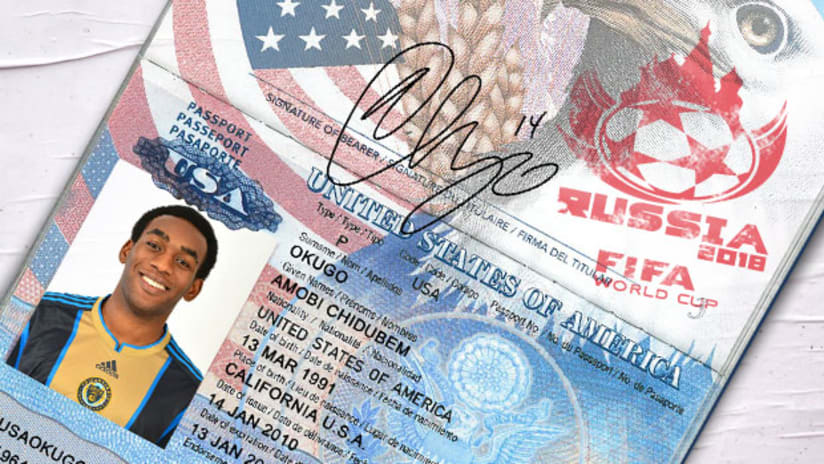"The Word" is MLSsoccer.com's weekly long-form series. This week, Philadelphia Union beat writer Dave Zeitlin looks at rising star Amobi Okugo, who has found his footing after a position change in 2012 and become of the one of the most promising center backs in the league. Can he find his way to success with the US national team, and a shot in the 2018 World Cup?
Amobi Okugo strolls into a Philadelphia restaurant, orders a mango pomegranate lemonade and settles into a window table. The popular Philadelphia Union player is dressed casually in a black t-shirt, jeans and sneakers. A single bead of sweat, perhaps a remnant of the training session that just wrapped up, hangs precariously beneath a new faded haircut.
Outside on Chestnut Street, a group of schoolchildren holds hands and crosses the street in front of a horse-drawn carriage. These are common sights in the area of Philadelphia known as Old City. Just down the block is Independence Hall, the birthplace of the Declaration of Independence and Constitution. Across the street from that is the Liberty Bell, one of America’s most iconic symbols. A few blocks away is Elfreth’s Alley, the country’s oldest residential street, where Okugo recently toured.
“It took me a year to finally realize how historic this area is,” says Okugo, who’s lived in the heart of Old City since first arriving in Philadelphia a little more than three years ago.
But Okugo isn’t here to talk about the past. He’s here to talk about the future. A future that looked gloomy just 10 months ago but has now never looked so bright. A future in which Okugo and the Union could return to the MLS playoffs after a disastrous 2012 campaign. A future in which Okugo might very well become the first Philadelphia player to ever earn a cap with the US senior national team while on the Union roster.
And it all started with a roll of the dice by the coach that knows him best.
---
OKUGO KNOWS THE QUESTION is coming and smiles when he hears it.
“It’s funny but I’m used to it,” he says. “I’m sure you guys are getting tired of asking it more than I’m getting tired of answering it.”
The question that reporters have been asking him for the past 10 months: Which position does he prefer between center back and defensive midfield?
And the answer he repeats, over and over again: It doesn’t matter.
LIKE LONG FORM? DOWNLOAD THE OVERLAP MAGAZINE APP!
Away from the locker room and in a more casual setting, the 22-year-old sticks to the same script – mostly. Opening up a little bit more, he reveals a slight preference toward the midfield, even though he’s played more defense in his MLS career.
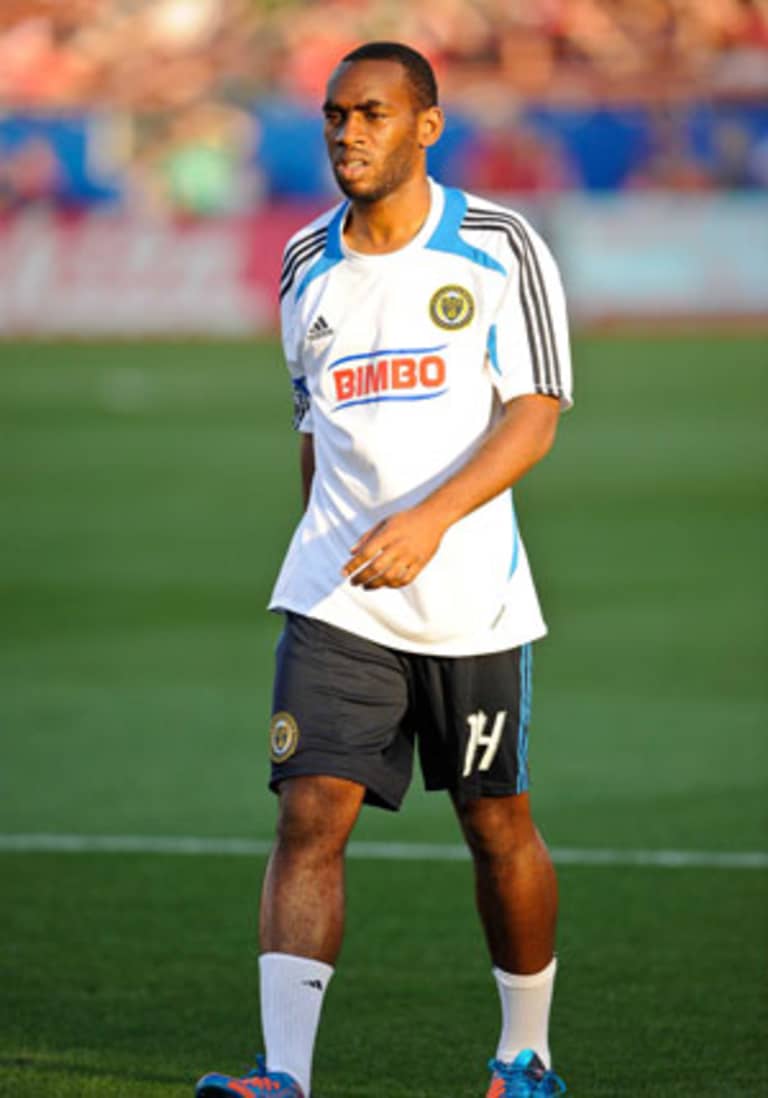
Philadelphia Union defender Amobi Okugo is one of only three players on the club who have played every minute since John Hackworth took over for former manager Peter Nowak.
- USA TODAY Sports
“I’m comfortable in the midfield,” he says. “I’ve played there all my life, from the U-14 to the U-23 national team. I got drafted as a center mid. I’m comfortable there. Center back is fine, too. It’s just a little difficult dealing with better forwards like Thierry Henry and Robbie Keane. But it’s fine. My skill set helps me out. And the players I’m playing with help.”
Okugo’s transition from midfield to defense happened last June when John Hackworth took over the reins from former manager Peter Nowak. Starting Okugo at center back was basically the first coaching decision Hackworth made as Union manager.
“People say it’s not his normal position,” Hackworth says. “But I wouldn’t have put him back there if I didn’t think he could have done it in the first place.”
Hackworth made the switch for two reasons. For one, the Union needed a center back following the baffling May trade of then-captain Danny Califf, one of the last straws that led to Nowak’s firing. And two, Hackworth knew Okugo, the sixth overall pick in the 2010 MLS SuperDraft and one of the last remaining Union originals, had been underused during his first-two-and-half years in Philly.
“At the time, me and [technical director Rob Vartughian] were absolutely 100 percent fine with that because we see every day what he’s doing in training,” Hackworth says. “We see what his work ethic is and we see his qualities. But I know it surprised a lot of people when we did it.”
Like many people, Okugo initially thought playing center back was simply a stopgap solution. He even used to jokingly ask Bakary Soumaré – a more established defender the Union acquired last June – how much longer it would take for him to get healthy so Okugo could return to the midfield.
READ: Five other MLS players who thrived after switching positions
But a knee injury limited Soumaré to just one appearance last season. And even though the 6-foor-4 Malian international returned to full health this preseason, Hackworth opted to keep Okugo as a center back and keep Soumaré on the bench – a move that surprised many people and ended up leading to a trade request from Soumaré.
So why didn’t Hackworth put Okugo back in the midfield this season? Or, perhaps more to the point, what position does the Union manager prefer for Okugo?
“So far, in his professional career, he’s been better as a center back,” Hackworth replies after a long pause. “But I’m not taking away the fact that he can be really good in a central midfield role. It’s just that we have Brian Carroll there. And the decision from us, from a coaching standpoint, was to only play one defensive midfielder.”
Okugo has certainly proven to be more than just a temporary center back. Along with Carroll and goakeeper Zac MacMath, he’s the only Union player who’s played every minute since Hackworth took over as manager. And even if he might feel more comfortable as a midfielder, he’s come to realize that defense might give him his best chance to become an MLS all-star and possibly even a US national team fixture.
“It worked out better than expected,” Okugo says. “And now everyone is talking about me playing center back.”
---
"[Cutting Okugo from the US U-17 team] was probably the hardest decision I made. And looking back on it, it was probably a bad one.”
-- former U-17 & current Union head coach John Hackworth
---
HACKWORTH WASN'T THE FIRST COACH to think Okugo would make a fine defender. When Okugo hit his teenage years as a rising star in the Sacramento circuit, his coach at San Juan Soccer Club, Ruben Mora, wanted to play him at center back for a big tournament. But Okugo’s father, Chris, would have none of it, and Amobi stayed where he was in the midfield.
Today, as Okugo continues to flourish as an MLS center back, Chris Okugo and Ruben Mora laugh about that story. But at the time, Chris was simply trying to look out for his son’s best interests.
“I wanted him to have the thrill to play in the midfield, so he could go forward and score goals,” the elder Okugo says. “Kids like to score goals. I didn’t want him to play defense.”
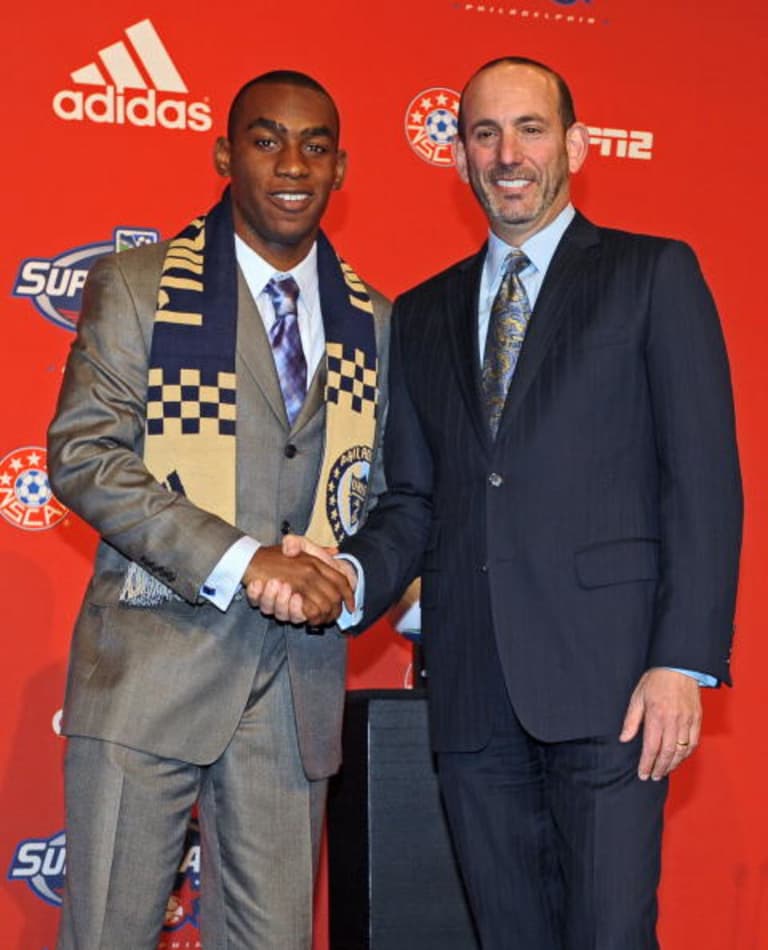
Okugo was once a kid no one wanted on their club team because they couldn't pronounce his last name. In January 2010 he heard his name called as a first-round pick at the MLS SuperDraft.
- Getty Images
Chris Okugo has always had an active role in his son’s athletic development. Chris and his wife, Chinyere, both grew up in soccer-crazed Nigeria, and when Amobi, the eldest of their four children, was young, they would take him to the park, where he’d run from end line to end line until he got tired.
In one of Amobi’s first leagues, Chris remembers no coaches wanting to select him because of his hard-to-pronounce name. But after scoring 14 goals in his first game, he became a hot commodity, beginning a swift rise through youth soccer that eventually landed him at the US U-17 residency program in Bradenton, Florida.
“I didn’t have to pay for anything,” Chris says of Amobi’s club soccer days. “And all the good players would follow him. That’s when I knew he would make it in soccer.”
While soccer was always an important part of the family’s life, Chris and Chinyere tried to instill other values in their son. Amobi couldn’t play video games when he had homework. Once, when he got a C on a Spanish test, he was forbidden to play in a soccer tournament. (“I was so mad,” Amobi says, “but I never got a C again.”) And when he decided to leave UCLA after one year to enter the 2010 MLS SuperDraft, he had to promise his mother he would eventually earn his degree. He’s currently trying to make good on that promise, taking online classes through Community College of Philadelphia.
The lessons Amobi learned growing up in a strict household and at Catholic school are evident. He’s probably the only player on the Union who sometimes refers to reporters as “sir.” He’s humble and respectful but still has a very likable personality. He’s been known to serenade fellow Union original and road-trip roommate Jack McInerney with Drake songs in their hotel room. He got behind the camera for a few PhiladelphiaUnion.com video segments. And he regularly blows up Twitter with jokes, motivational words and pictures of teammates that lose the credit card roulette game the Union players always seem to play at restaurants. (“Sometimes, you’ve got to press unfollow because he’s always in your feed,” McInerney says with a laugh.)
CHECK OUT THE COMPLETE ARCHIVES OF "THE WORD"
He’s also the kind of person that once, while playing basketball in the 4th grade, continually passed the ball to the kid on his team with a developmental disability. Chris was in the stands for that game and asked his son afterwards why he did that. “I wanted to make sure he made a basket in his last game,” Amobi told him.
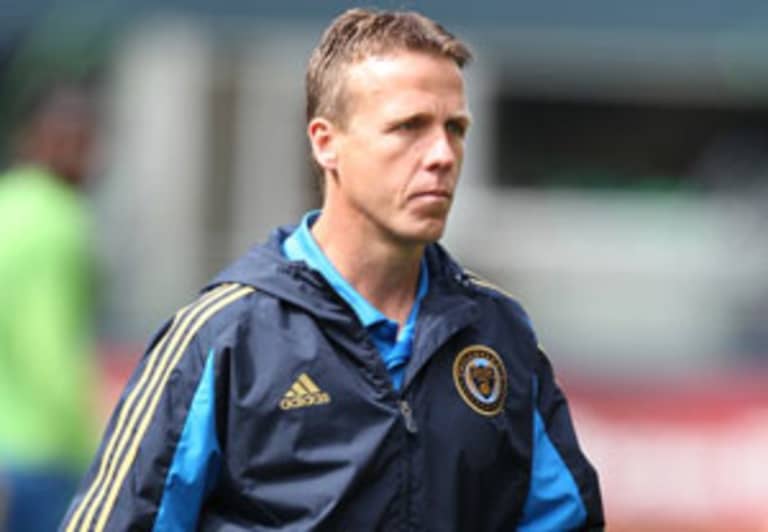
Hackworth originally slotted Okugo into a defensive role out of necessity, but now the Union head coach says that "so far, in his professional career, he’s been better as a center back.”
- Getty Images
Amobi was a good basketball player growing up, as was his brother Akachi, who’s currently playing at a junior college in the hopes of getting a Division I hoops scholarship. But soccer is what has always brought the family together. When the Nigeria or US national team are playing, the Okugos often throw parties, the smell of fufu, fried yams, goat meat and other Nigerian delicacies emanating from the kitchen. Sometimes, they even play a little soccer inside the house, where Chris is always crowned champion.
Chris – who Amobi calls “my dad, my manager, my agent and my coach all in one” – continues to follow his son’s progression very closely. He watches MLS and the US national team religiously. He talks to Amobi on the phone all the time and sometimes tells his son that he’d be better in the midfield, just like he did a decade ago. But perhaps because of the lessons he learned from his father himself, Amobi recently told his dad something about his position change that really resonated.
“I don’t know why you’re worried about it,” Chris remembers Amobi saying. “All I want to do is play.”
---
SOMEWHERE OVER THE ATLANTIC OCEAN, Amobi Okugo was roused from an airplane slumber by a tap on his shoulder. He opened his eyes to see John Hackworth, who was in charge of the US U-17 residency program while Okugo was there.
This can’t be good, Okugo thought.
It wasn’t. Hackworth let Okugo know he was not going to go to the 2007 U-17 World Cup. Okugo, younger than other players in residency, was one of the last cuts from a squad that featured future Union teammates Sheanon Williams, Danny Cruz and Zac MacMath. It hit Okugo hard. And that US team ended up bowing out of the tournament in the round of 16.
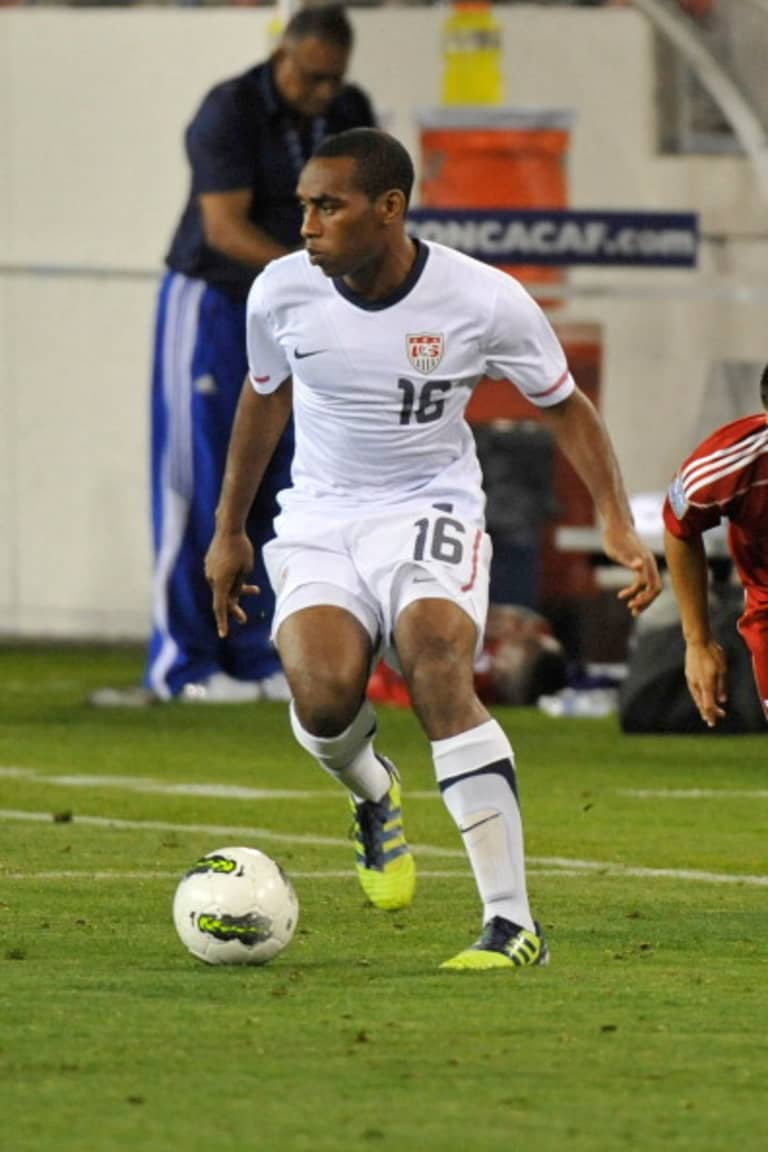
Despite being a mainstay at all levels of the US youth national team system and featuring prominently for the US during last year's Olympic qualifiers, Okugo says he feels like he's cursed when it comes to the international level.
- USA TODAY Sports
“At the time, it was probably the hardest decision I made,” Hackworth says. “And looking back on it, it was probably a bad one.”
Despite being a mainstay at all levels of the US youth national team system, Okugo had other similarly rough encounters. As one of the youngest players in the pool again, he was one of the last cuts for the U-20 World Cup team in 2009, which he called a “heartbreak.” Two years later, when his own cycle came around, Okugo was a key player for the U-20 team but endured another heartbreak when they failed to make the 2011 World Cup following an upset by Guatemala in CONCACAF qualifying. And to top it all off, the US U-23 team, of which Okugo was a key player, failed to make the 2012 Olympics after a stunning collapse against El Salvador last year.
“I feel like I’m cursed,” Okugo says.
Of course, that’s not entirely fair. Okugo has still done a number of good things on the international stage and has impressed many coaches along the way, including, most recently, Timbers head coach Caleb Porter, who directed the US U-23 team before getting the job in Portland. Porter noted there was even a point when he used Okugo at center back at training because they were lacking depth in that spot and he saw the kind of versatility in Okugo that many other coaches have also noticed.
“It doesn’t surprise me he’s done so well at center back with Philly – mostly because he’s just a solid player,” Porter says. “He’s versatile. He’s athletic. He’s tough. He’s got a good head on his shoulders. He’s very clean in possession. He keeps the game simple and yet he’s a very effective player. I was really impressed with him when he was with us. He was a player that had a lot of character.”
And yet, it didn’t always seem that his club coach – at that point, Nowak – felt the same way. When Okugo returned from the disappointment of Olympic qualifying, he was met with even more disappointment on the home front. Over the next eight games, he played only 160 total minutes, as he was shuffled from starter to second-half sub to unused sub without so much as a reason. And Okugo did ask for reasons, going into Nowak’s office almost once a week during those rough days. Nowak would tell him that he was the future of the club and to keep his head down. But it didn’t feel that way.
“I was calling my agent once a week, talking to my dad every day,” Okugo said. “It was tough. I was hoping the Olympics would be my escape from the club but that didn’t happen. So I was like, ‘I’m going to be stuck in Philly, chilling in Old City doing nothing.’”
But then, just like that, Nowak was gone. And Okugo’s growing self-doubt and stunted development followed him out the door.
---
"There’s no real tandem right now in the center back position. It seems like it's a position that our country is lacking in. And that’s something [Okugo] should definitely work for.”
-- Union center back Jeff Parke
---
IS AMOBI OKUGO ON THE CUSP of greatness? Will he one day play in a World Cup? Could he be the next big thing in American soccer?
We like to ask these questions because, well, they’re fun to ask. But often they are just as hard to answer. Those who know Okugo best, however, think he has a few things working in his favor. For one, the combination of playing at every level in the US youth national system with the consistent minutes he’s now earning in MLS is an enticing recipe. And his ability to play multiple positions, his athleticism and leaping ability, his fierce ambition, and his good mental makeup could end up being equally enticing to US national team coach Jurgen Klinsmann.
“Players that are comfortable on the ball and have the technical ability and have a good tactical understanding are versatile players – and coaches tend to find those kind of athletes a spot on the field,” Hackworth says, citing promising US defenders Matt Besler, Omar Gonzalez and Geoff Cameron as a few examples. “I don’t think Amobi right now says, ‘Hey, I deserve a shot at the national team.’ I think it’s a progression where if Amobi is playing well, it would be logical for Amobi to be considered as part of the conversation.”
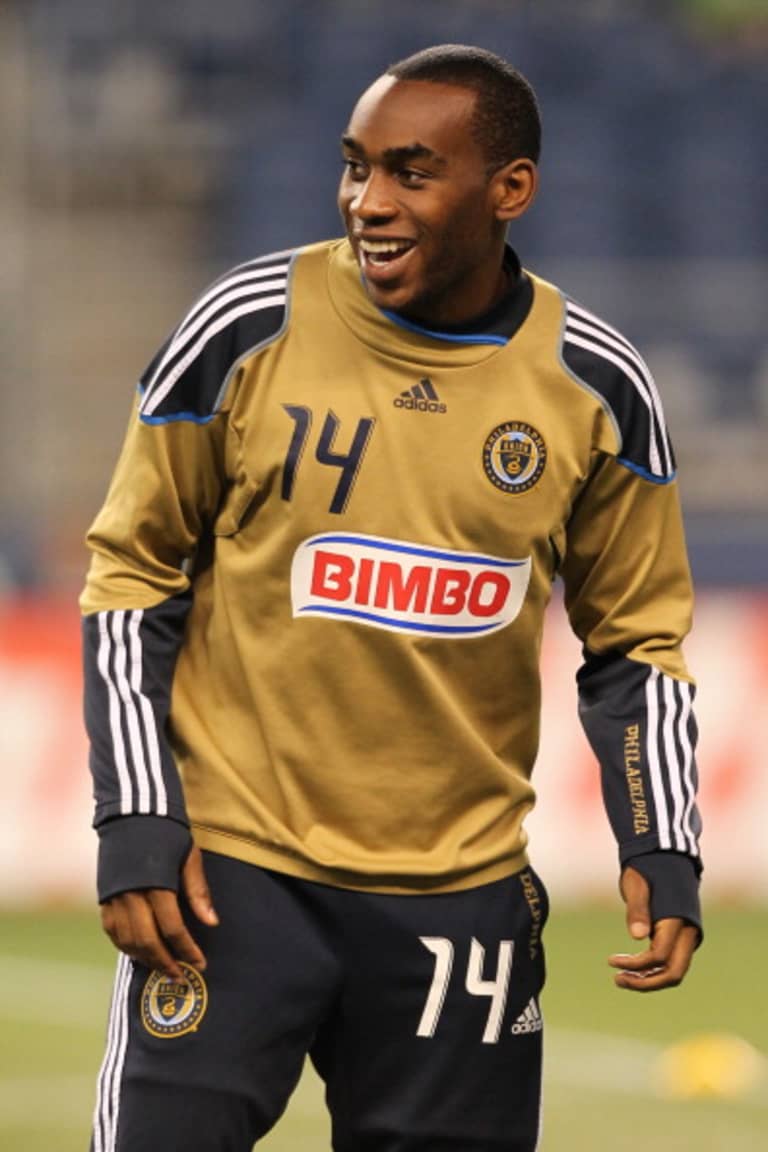
Will Okugo feature one day for the US national team? His best chance might be at center back, and his father is sure he'll be a succcess. Says Chris Okugo: "The World Cup in 2018, he should captain the US team. And I think he will.”
- Getty Images
Jeff Parke, Okugo’s new center back partner on the Philly backline and a recent call-up to a US national team camp himself, believes Okugo has a bright international future. Parke also understands how difficult it can be to switch positions to the less-glamorous backline – he did it a long time ago and says he’s still not completely over it – but believes the calmness and cleverness on the ball Okugo learned in the midfield makes him a calm and clever center back. And that’s something he believes the US national team needs.
“There’s no real tandem right now in the center back position,” Parke says. “It seems like it's a position that our country is lacking in. And that’s something he should definitely work for.”
Okugo isn’t trying to look too far ahead. But he’s also not shy about his ambitions. One of his goals coming into the season was to make the US roster for the 2013 Gold Cup, a tournament that should allow Klinsmann to break in younger players. And he definitely has his sights set on playing professionally in Europe one day. But before any of that can come to fruition, he knows he must continue to excel in Philly, where he’s grown close with his teammates, many of whom – like McInerney – could also be on the cusp of big things.
“No one really notices losers,” Okugo says. “If we win as a team, individuals will start to stand out. That’s the most important thing – the team winning and making the playoffs.
“I always set my mind on setting goals,” he continues. “I feel like I’m getting closer. But there’s a lot more left. I still have a high ceiling to reach.”
How high can that ceiling go? One admittedly biased person has a good idea.
“I can bet anything,” Chris Okugo says. “The World Cup in 2018, he should captain the US team. And I think he will.”
Dave Zeitlin covers the Union for MLSsoccer.com. He wrote about three heroes coming home to Philadelphia earlier this season. Email him at djzeitlin@gmail.com.

